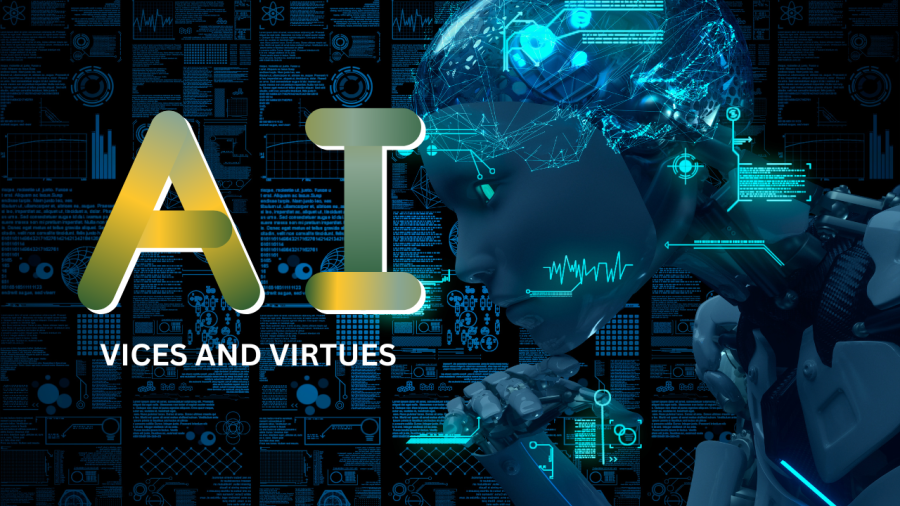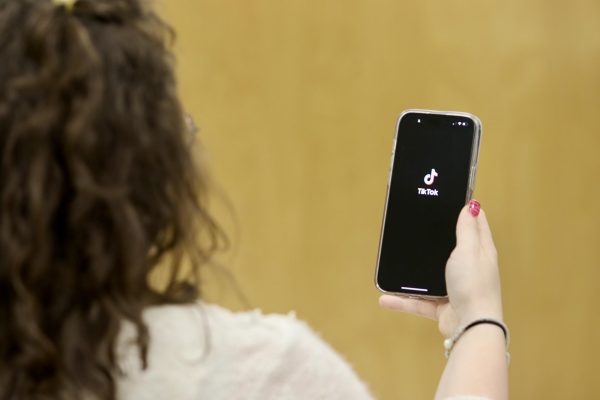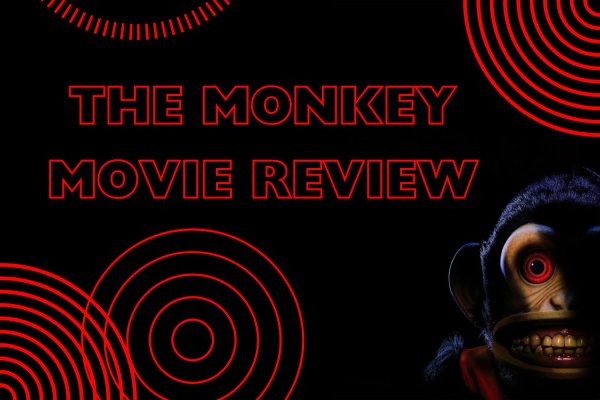HEAD TO HEAD | Vices and virtues of ChatGPT
Introduction to the AI discussion, by Dathan Sanders
It’s no secret that ChatGPT has taken the world by storm. Now, artificial intelligence isn’t only limited to creating rap tracks and mock interviews – it has made its way to the classroom, passing every test thrown its way.
ChatGPT is an AI chatbot that can answer, create or solve anything asked. It was first launched in November of 2022, and ever since, some have gotten upset about how good it is at churning out human-like text.
Created by Sam Altman, the AI software was initially made to help debug code and ask obscure programming questions. Still, it has been taken to new heights as people find more elaborate ways for its use.
Since GPT’s release, some students have tried using it on their school work, and not only does it give direct answers to multiple choice and true or false questions, but it also can write an entire essay for you with no traces of plagiarism. However, the greatest accomplishment of ChatGPT from an academic standpoint is probably when it passed the Uniform Bar Examination.
Some professors feel this is a way of cheating and plagiarism that can soon cause future problems.
“What is plagiarism?” If plagiarism is copying somebody else’s work, GPT is copying. It’s just not acknowledging. We’re going to be getting into many copyright law discussions soon,” Katina Michael, professor at Arizona State, said.
However, some professors also feel this can be an excellent tool for students and can even be created with it.
“It might be something that can be interesting in a creative context if you take possession of it as a tool and make the process of how you use it part of your fiction-making or any other kind of creative endeavor,” Professor Marshall Klimasewiski from Washington University said.
Along with discussions among students and professors, offices across all campuses are figuring out how to deal with the repercussions ChatGPT and other programs can cause in the academic world.
The Office of Student Advocacy and Accountability’s provided statement on AI use with classwork is, “Using Artificial Intelligence (AI) to produce work that a student claims as their own could be a violation as outlined in Southeastern’s Student Code of Conduct and the Academic Integrity Policy. Sanctions range from warning to expulsion from the university. The best advice is to review the Student Code of Conduct and the Academic Integrity Policy to become familiar with university policies and procedures.”
In my opinion, ChatGPT could be considered cheating in some ways for students. But I also feel students can use it as a guide for help when their professor is not around. ChatGPT provides you with the answer and the explanation to help you further understand. In addition, this provides a second teacher for students during the later hours after class.
Only time will tell what the future of ChatGPT will be in society and the classroom.
ChatGPT is not the devil even though it is so tempting, by Kaitlyn Keppler
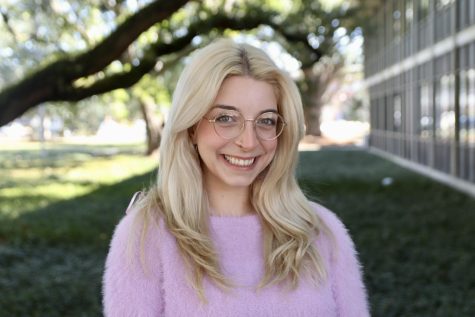
ChatGPT is not the newest form of artificial intelligence sweeping the nation, but it is becoming the most talked about. Teachers and professors fear the new software may bring the downfall of academic integrity to their classroom, but I believe ChatGPT is not evil, though it may not be entirely good either.
The main concern that many educators and parents have is that ChatGPT will allow students to cheat as often as they want and not learn anything. This could allow students who haven’t put in any work to receive better grades than their peers. However, ChatGPT does not label itself nor pride itself as a cheating outlet.
I prompted ChatGPT to give me a quote about using ChatGPT in classroom environments, and it replied, “As an AI language model, I can be a useful tool for learning and teaching in classrooms. However, it’s important to keep in mind that I am not a substitute for human teachers and that my responses are generated based on the data I was trained on. Therefore, it’s important to use me as a supplement to traditional teaching methods and to critically evaluate the information I provide.”
As a student, I know there was cheating before AI, and there will be cheating with or without it. I believe that cheating is morally wrong. However, if a student asks ChatGPT to explain something they did not understand in class and then use that knowledge to answer questions or write essays, then there isn’t anything wrong with that.
Turnitin is an artificial intelligence device that educators use to see if anything a student turned in is plagiarized. Turnitin can now also detect if something was written by ChatGPT, eliminating plagiarism accusations, so it isn’t something that teachers have to be overly worried about when grading assignments.
ChatGPT gave threspondedsked if it could be used for cheating: “As an AI language model, I do not condone or encourage cheating. It is important to uphold academic integrity and honesty in all aspects of learning. While I am capable of generating responses to questions, using me to cheat on exams or assignments is not ethical and goes against the principles of learning and education. It is important to use me as a tool for learning and to use the knowledge gained from our interactions for academic and personal growth.”
In college, it can be hard to keep up with certain lessons or assignments because there are too many students in a lecture for a teacher to focus on individual learning styles. As a result, students often resort to online or textbook materials to ensure they are learning the correct information.
I believe ChatGPT is an effective way to access quick information by asking questions and giving prompts for the intelligence to follow. Students can pretend the website is their professor and ask it for help creating papers or conducting research without having to wait for their actual professors to respond.
ChatGPT is incredibly resourceful for students with social anxiety who would rather never ask for help than risk embarrassment in the classroom. According to NBCI, 75% of students reported they sometimes felt uncomfortable asking questions themselves; ChatGPT eliminates this fear and still allows the student to be heard.
Unfortunately, ChatGPT isn’t always accurate. When using the software, a warning is issued beforehand that the information received may not be entirely accurate. Answers could also be manipulated if the user asks the question in different ways multiple times.
Ethan Mollick, associate professor at the University of Pennsylvania’s Wharton School, has incorporated ChatGPT into his course policy. He even ran a session where students were asked to develop ideas for their class project. First, the class used ChatGPT to generate projects and ideas, and then they interrogated the bot’s ideas with further prompts.
Mollick said, “And the ideas so far are great, partially as a result of that set of interactions.”
Anything can be used negatively, depending on the person using it. I have used ChatGPT multiple times when writing assignments to pluck inspiration to ensure I am doing the best work I can. I have also used it in real-world circumstances to email potential employers and persuade them to hire me for their vacant position. ChatGPT is not something to fear. It is something to embrace. Technology is advancing, and the world is changing. Learn to utilize ChatGPT rather than try to ban it.
Education and student creativity will suffer from ChatGPT, by Kennith Woods
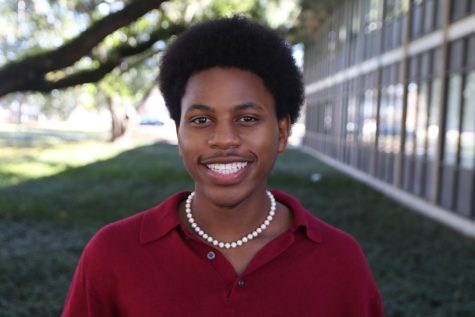
The past few years have seen the rise of artificial intelligence being available for public use. The most notable example has been ChatGPT, an “AI powered language model.”
ChatGPT’s capabilities are pretty impressive. For example, with just a simple prompt, the AI can produce a myriad of different writings, including essays, letters and emails.
The software, released in November 2022 by OpenAI, has experienced incredible success and usage. After two months, ChatGPT amassed a monthly user base of 100 million people.
Given its popularity and writing competence, ChatGPT quickly reached college campuses. A January survey found that 30% of college students have used ChatGPT, and of that 30%, nearly 60% used the AI on “more than half of their assignments.”
Human submissions are increasingly being replaced by AI-generated content. If this change had meaningful benefits, I’d certainly be all for it. However, that benefit has yet to reveal itself.
Many will argue that the positive of using AI on college campuses is that it saves students time and energy, and this is true. For example, feeding ChatGPT a writing assignment will produce an essay faster and more efficiently than any human can, saving students time and energy and easing their stress in the short term.
In the long term, students will be presented with a massive consequence: they won’t learn anything.
By having ChatGPT complete their assignments, the educational value of that assignment is rendered moot. It’s akin to paying a classmate to do their homework; the task is completed in both instances, and the grade book appears stellar. Ultimately, they are setting themselves up for failure because they haven’t learned the coursework.
Proponents of AI use on campus argue it does not replace student work and effort but rather is a tool meant to supplement learning and educational techniques. This is not necessarily true, though. For example, an educational tool assists learning, while ChatGPT outright replaces the student.
A calculator helps a student complete a set of math problems–it does not finish their homework for them.
I could see the potential for AI chatbots to act as electronic teacher assistants, readily available at all hours of the day to answer questions when students’ professors aren’t. However, for sPT’s capabilities must be severely reigned in.
Also, for such an outcome to take place, I am uncomfortable with the idea that AI-generated content comes at the cost of student creativity. Now, I can admit my bias. I’m a writer who enjoys writing and sees it as an art form.
I look forward to a world where AI takes on difficult jobs; that way, people have more time to enjoy their lives and create art. I do not look forward to AI taking our place as artists.
A human element and a sense of thoughtfulness and struggle are what makes us connect so deeply with art. Unfortunately, with ChatGPT, these connections are thrown to the wayside.
Think about The Pick or The Manchac Review, two student-edited publications curated by Southeastern’s English department. These publications feature students’ creative works in areas such as fiction, poetry and drama. If ChatGPT was the author behind these beautifully written pieces of art, would we still feel a meaningful connection to them?
Lastly, I’m worried the use of ChatGPT will further facilitate a decline in humanities students. After all, the end of the English major is already upon us.
Enrollment numbers in English and history collegiate programs are a third of what they were a decade ago, thanks to a false sentiment that humanities students cannot find gainful employment through their field of study. If ChatGPT use continues growing on college campuses and replaces human writing, humanities students may feel discouraged from pursuing their passions, which will continue to decline.
ChatGPT and AI-generated content can potentially help students learn in the classroom. However, its current implementation as a glorified ghostwriter for students does not fulfill that potential. Students need to learn and create on their own, not dole out that responsibility to ChatGPT, because the ramifications of AI use on college campuses could be tremendously negative.
I will fully support a transition in educational techniques when AI becomes a viable supplemental tool in the classroom. But, until then, college campuses should do their best to power down ChatGPT.
Your donation will support The Lion's Roar student journalists at Southeastern Louisiana University.
In addition, your contribution will allow us to cover our annual website hosting costs.
No gift is too small.
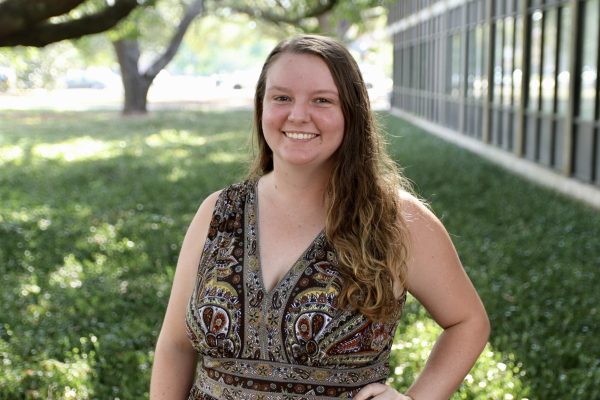
Hydee Holsapple is an integrative biology major with minors in chemistry and communication. She has been with The Lion's Roar team since Feb. 2022 and...


